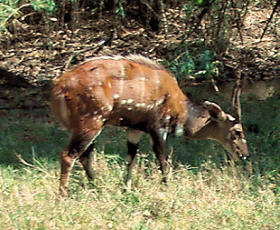|
| Query: tragelaphus | Result: 2nd of 123 | |
Bushbuck (Tragelaphus scriptus) - Wiki
| Subject: | Bushbuck (Tragelaphus scriptus) - Wiki
| |

| Resolution: 280x230
File Size: 25794 Bytes
Upload Date: 2007:12:15 00:16:00
|
Bushbuck
From Wikipedia, the free encyclopedia
Order: Artiodactyla
Family: Bovidae
[Photo] Bushbuck: Tragelaphus scriptus, Bovidae. Mundawanga, Lusaka - Zambia. For taxobox purposes. Date 5/06/2005. Author Hans Hillewaert (http://commons.wikimedia.org/wiki/User:Lycaon)
The Bushbuck (Tragelaphus scriptus) is an antelope that is found in forest and woodland throughout Sub-Saharan Africa. Also called "bush antelope", this is used occasionally for any relativers with which it shares its habitat.
Bushbuck stand about 90 centimetres at the shoulder and weigh from 30 to 80 kilograms (depending on sex). Bushbuck have a light brown coat, with up to seven white stripes and white splotches on the sides. The muzzle is also white. Horns are found only on the males and they can reach over half a metre with only one twist.
Bushbuck are found in all types of bush, from open forest to dense woodland. They eat mainly browse but supplement their diet with any other plant matter they can reach. Bushbuck are active around 24 hours a day but tend to be nocturnal near human habitations. Bushbuck tend to be solitary, though some live in pairs.
All bushbucks live within a "home" area they will not normally leave this area, which is usually around 50,000 square metres on the savannah and much larger in the forest. These areas usually overlap other bushbuck home areas.
http://en.wikipedia.org/wiki/Bushbuck
| The text in this page is based on the copyrighted Wikipedia article shown in above URL. It is used under the GNU Free Documentation License. You may redistribute it, verbatim or modified, providing that you comply with the terms of the GFDL. |
|
Comments |
|---|
| | Guest |
|
| The kéwel (Tragelaphus scriptus) is a small to medium-sized antelope widespread in west and central Africa. Formerly and alongside the imbabala it was generically known as the bushbuck, however, it has since been found to be a species in its own right, with a separate geographic distribution. |
^o^
Animal Pictures Archive for smart phones
^o^
|
|
|